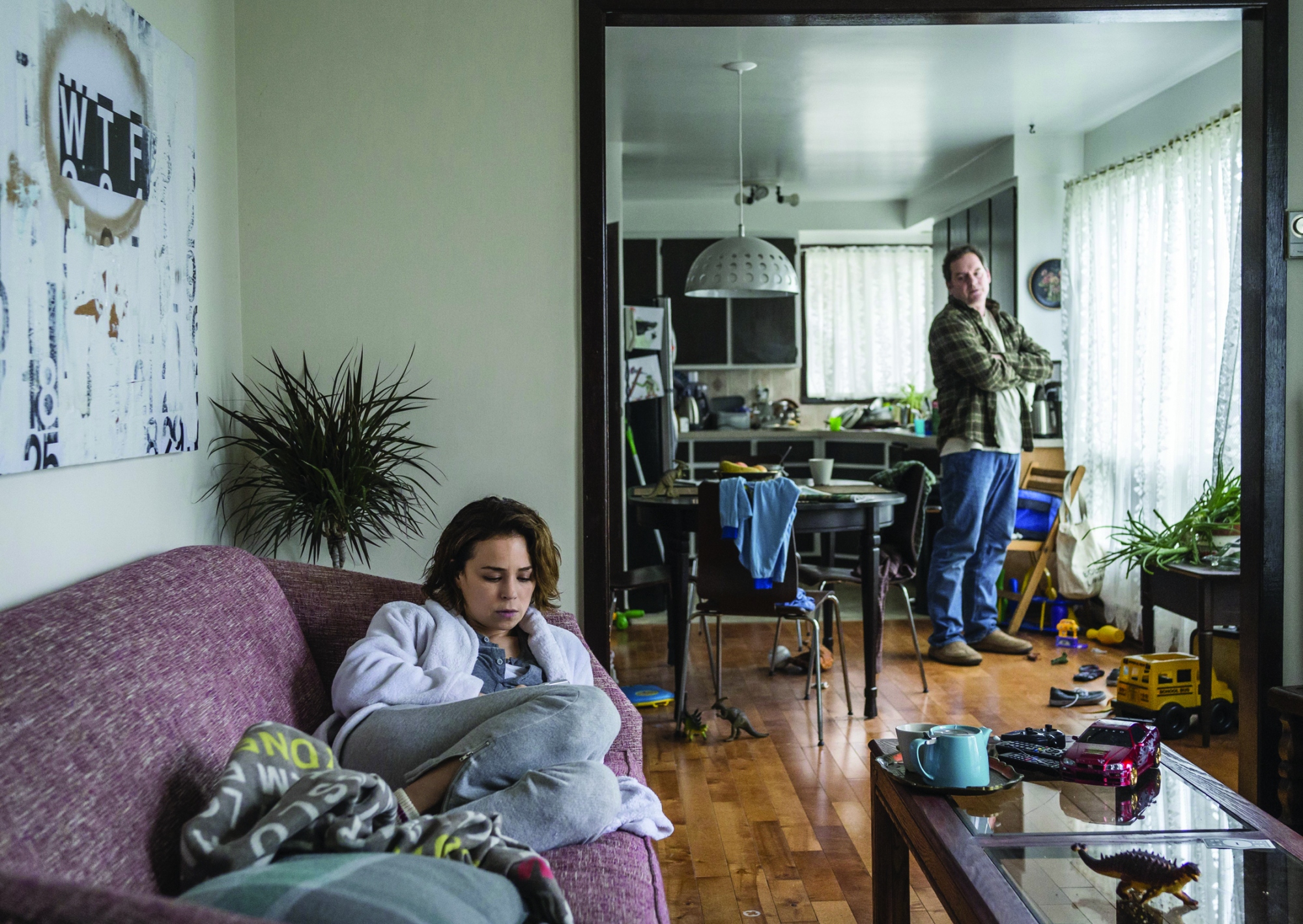Michael Rowe’s Early Winter (2015) begins at the intimate centre of a fractured relationship. The film opens on married couple David (Paul Doucet) and Maya (Suzanne Clément) mid-coitus. Their lovemaking is indifferent; their demeanour afterwards is uncommunicative. She brushes off a line of inquiry with a tense ‘don’t start’, and soon shuffles off the end of the bed while he lies at the head. They’re separated by the cinema screen: her hunched form out of focus to the left of the frame, his supine body, to the right.
It’s not shot like a traditional sex scene. Rowe and director of photography Nicolas Canniccioni use a fixed camera – as in Rowe’s Caméra d’Or–winning debut, Leap Year (2010) – to shoot the scene from the top of bed. The framing neither obscures nor objectifies the actors’ nudity, instead offering a perspective that is at once detached and unpretentiously quotidian. As an opening scene, it’s an effective representation of the film that follows, which is defined both by its aloof cinematography – a consistently static camera, the absence of extradiegetic music – and by its protagonists’ disintegrating relationship. This relationship is one whose fleeting moments of tenderness and passion are soon subsumed by doubt and jealousy, and pierced by painful shards of history.
Rowe’s decision to create an aesthetic distance from his characters lends the film – a Canadian–Australian co-production – a chilliness that aligns with its title and its snowy Canadian setting. The director’s distinctive style is a deliberate consequence of his mistrust of emotional ‘manipulation’. He tells me:
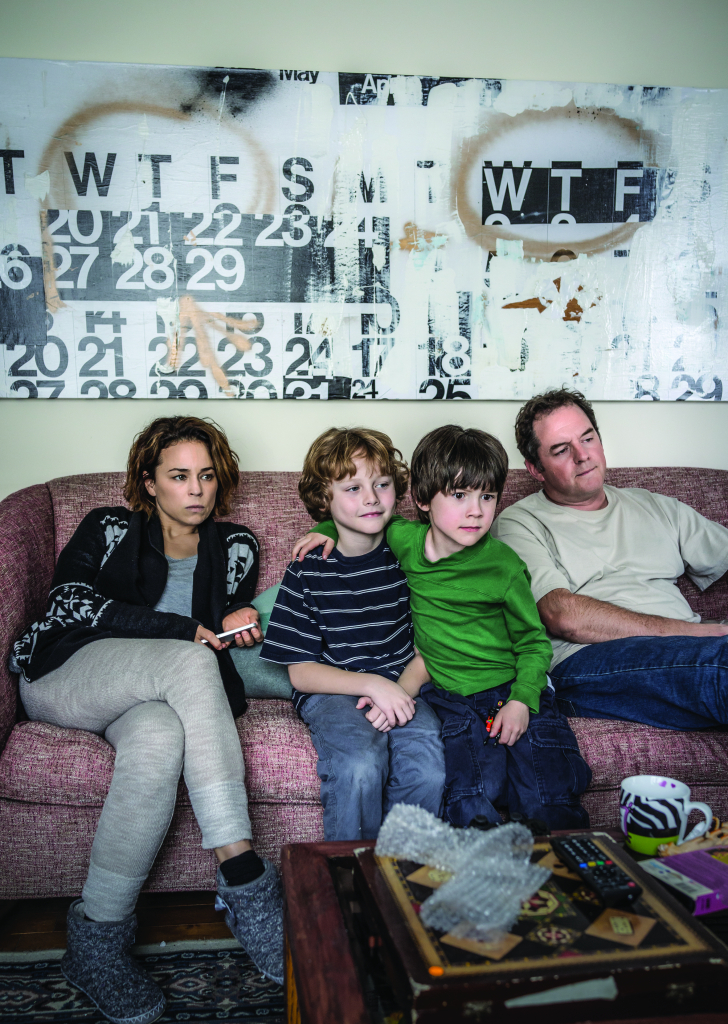
I believe very deeply that film is narration and, as such, the most important things in a film are the script and the acting […] I feel like putting extradiegetic music over the film is a way of manipulating the audience and obliging them to feel things that you didn’t necessarily achieve through the basic tools you have at your disposal – which is the script and the actors. I feel like it’s dishonest, in a way. And [this is] the same with camera movements.
Early Winter nonetheless coaxes viewers into an emotional response. Rowe leans on his script to do the heavy lifting, noting that ‘when you construct a narrative, you’re inevitably manipulating an audience with the distribution of the information – how much you withhold, and when you let it go’.
As the film progresses, our understanding of David and Maya’s relationship – and its rifts – gradually grows. We meet their two boys. We follow David to work at a nursing home, where he cares for elderly patients, fading away. We watch the couple’s bickering turn from trivial domestic disputes – the cost of a car, the cleanliness of the kitchen – to battles triggering old wounds: infidelity, alcoholism and the death of David’s daughter from an earlier marriage. This meting-out of information is aided by Rowe and Canniccioni’s careful camera placement, which strategically reveals and conceals critical facts from the audience as the narrative unfolds. ‘I like to cut things off,’ Rowe explains. ‘I like to frame in such a way that there’s a certain dramatic tension in the frame because you don’t have all the information.’
Adopting David’s perspective reinforces the film’s deliberate drabness. The monotony of his life, combined with the wintry setting and cool cinematography, conjures an atmosphere of decay, despair and, most powerfully, depression.
Objects
An early scene sees Maya chide one of their sons for playing with a toy of hers, a valuable collectible. We don’t get a good look at her toy collection – ‘plastic rabbits’ mounted on a pair of shelves above the dining room table – until more than a half-hour into the film, and it’s not until a heated argument well past the one-hour mark that we learn of their significance: they’re gifts from her ex. The whole film proceeds in this fashion, doling out the particulars of the individual and combined histories of Maya and David.
The aforementioned plastic rabbits are only some of a number of props used to enrich Rowe’s exposition-averse screenplay. The presence of the couple’s two children, for instance, is reinforced even when they’re off-screen by the clutter of their toys. (‘I wanted a permanent presence of the children there, in terms of the dinosaurs and the toys lying around and stuff,’ notes Rowe.) Early Winter also uses props to separate and differentiate between David and Maya. More often than not, she is seen tapping away at her smartphone; the device’s presence widens the fissure between her and David, who seems perplexed by, or at least disinterested in, modern technology. The iPhone is a talisman of separation: Maya is haloed by its blue glow in the bedroom at night, with David snatching it from her at one point to jealously peruse her text messages.
Like Maya’s mobile phone, a range of other props also operate as tools for characterisation by associating her with modernity in a way that distinguishes her from her husband. He drives a beat-up ute; she drives a flashy hatchback. He repairs old refrigerators and transistor radios, while she plays Bejeweled. (It is surely no accident that one of the few moments of real connection between the couple occurs when Maya connects her phone to his modified radio.) By the same token, David’s association with older objects is, in part, a reflection of his age (along with his complaints about his back and his work with geriatric patients). But, more significantly, these props hint at his imprisonment in the past. His attempts to repair derelict fridges and run-down radios are consistent with his own difficulty reconciling the demons of yesterday – his daughter, his alcoholism and even Maya’s ex-boyfriend. He seems trapped, striving to repair things in his life that cannot be fixed.
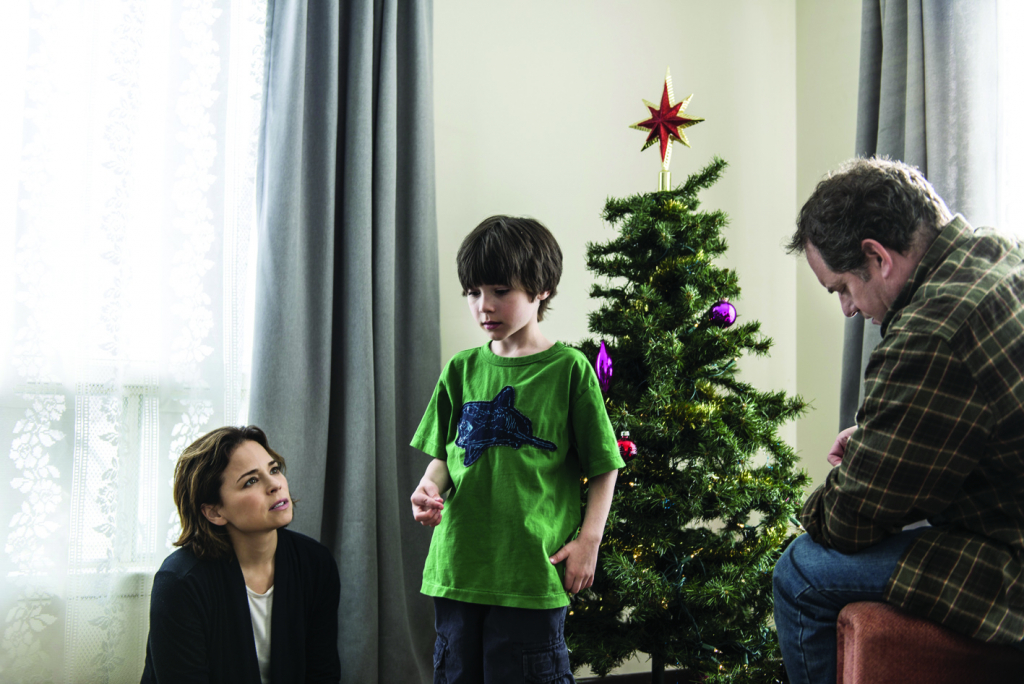
Solitude
Rowe describes Early Winter as the third film in his ‘Trilogy of Solitude’ (preceded by Leap Year and 2013’s The Well); this suits the atmosphere of loneliness that pervades the film despite it being, fundamentally, a relationship drama. ‘One of the primal and permanent struggles in life is existential solitude,’ he says.
I think that all love stories are about the struggle to escape that, and I think it’s just part of the human condition – the fact that we can’t have some other human being inside of our brain with us. It’s difficult to have real company. It’s something you have to construct, and it’s not easy. I think it’s something that’s universal.
David and Maya’s disconnection is reinforced by the fixed camera, accentuating the stasis that their relationship has settled into. Conversations that aren’t brief and banal soon descend into passive-aggressive confrontations. As in the opening sex scene, Doucet and Clément are regularly positioned either at opposite ends of the frame or at a distance from one another, whether in separate rooms or facing away from each other in bed. At one point, Maya yells at her husband, ‘You’re never here. You’re not here!’ – and she’s referring to more than just his being at work at the nursing home. They may be in the same room, but they’re not together.
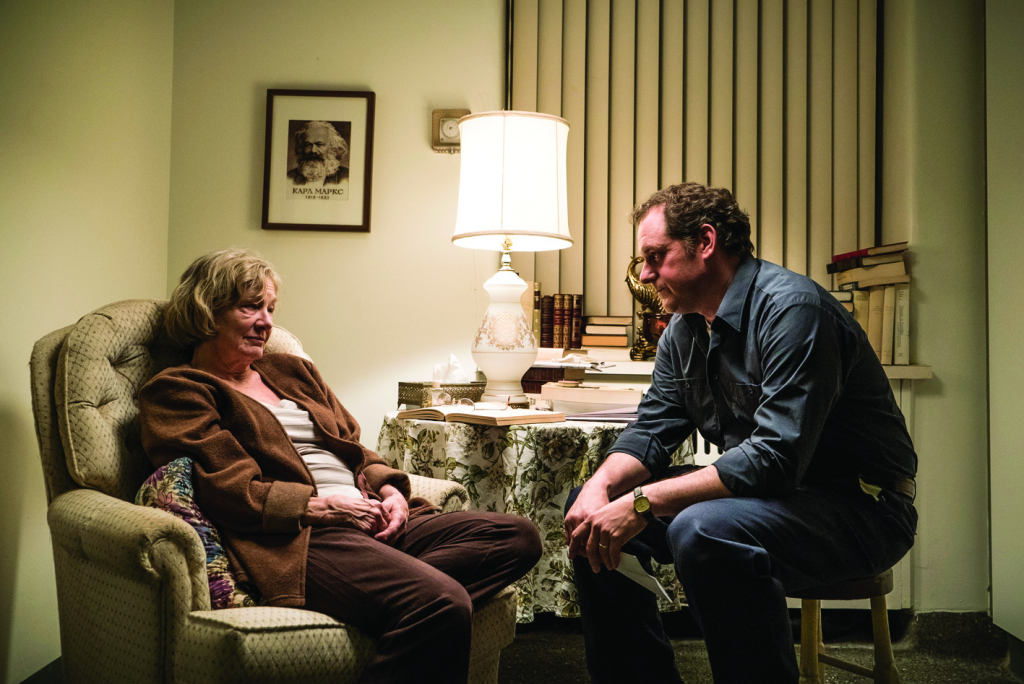
The deliberate cinematography also affords Rowe the opportunity to create emotional impact by breaking forth from the convention and rhythms he’s established. The film only includes three close-ups throughout its running time, and each is granted power by its rarity. Two of those close-ups are of David’s face. The first is the oblique reveal of the tragedy lurking in David’s past when, at an Alcoholics Anonymous meeting, he begins to confess about how he killed his daughter in a drink-driving accident. The final close-up has a ragged emotional tenor: we’re taken inside David’s ute idling above a quarry as he contemplates suicide.
David’s suicidal thoughts are precipitated by the discovery of his wife at home having dinner with Alexandre (Alexandre Marine), her ex-boyfriend who gave her the plastic rabbits. It’s not an entirely unexpected development – for days, David had been needling Maya over the likelihood of Alexandre being at an upcoming conference – but it becomes the climax of the film, an eruption of dramatic tension that shatters their relationship’s fragile facade of mere mistrust.
Rowe films the ensuing fight – Early Winter’s dramatic apex – differently than the scenes around it. While the film’s established conventions – no music, no camera movement – are maintained, the couple’s argument hews closer to traditional cinematic grammar. As their yelling match roams from room to room, the camera follows them and even offers up a bit of shot / reverse shot when – in one of those rare close-ups – David spots a used condom floating in the toilet bowl. This aesthetic deviation lends the scene an energy and immediacy, creating a heightened sense of event while drawing us into David’s devastated headspace.
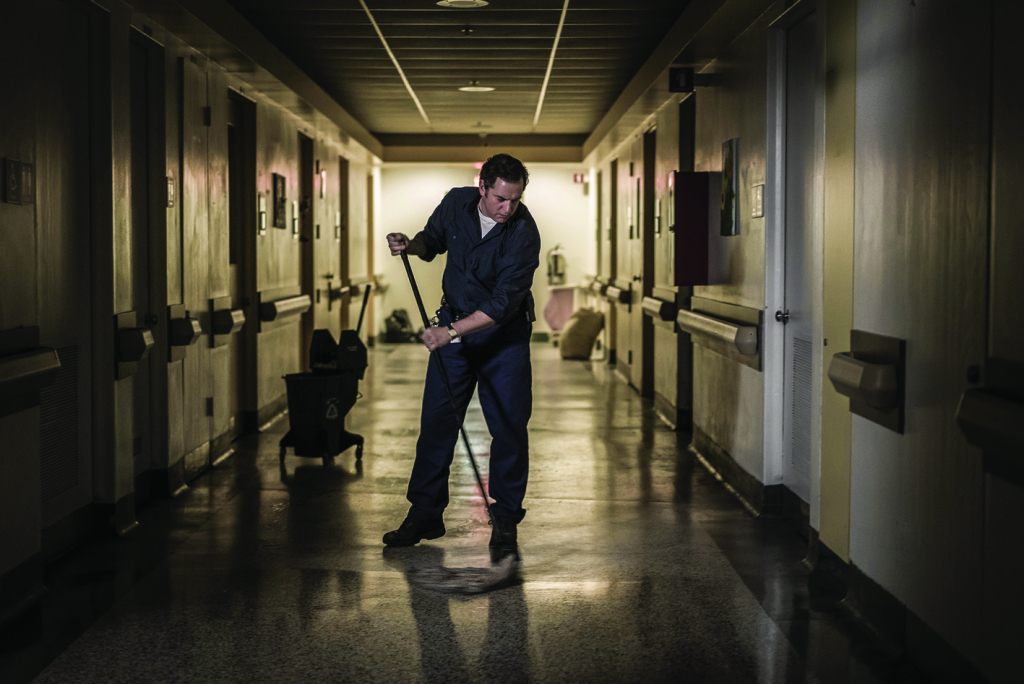
Perspective
That headspace is, by and large, where Early Winter resides. While we are occasionally offered insight into Maya’s world – as when we observe her attempt to meditate dissolve into anguished tears – it is David whom we follow throughout the film. That offers up the possibility for misinterpretation; at the time of writing, for instance, the film’s IMDb synopsis misleadingly reads: ‘David, a man in his forties, who has sacrificed his life to his wife and kids fights to keep them close to him.’[1]‘Early Winter (2015)’, IMDb, <http://www.imdb.com/title/tt2625968/?ref_=ttfc_fc_tt>, accessed 18 May 2016. When asked about his decision to tell the film from David’s perspective, Rowe shares his belief that ‘it’s always stronger to take a story from the point of view of the one who doesn’t have the power in the relationship.’
If I’d done it from Maya’s perspective, I would’ve explored how she was the victim in the relationship and it would have been a very different film. Because, of course, there are two sides to every story, and nobody’s 100 per cent innocent or 100 per cent guilty in any situation. I feel that women are often portrayed as victims, especially in relationship dramas, and I think that is bordering on a cliché […] it disempowers women.
Moreover, adopting David’s perspective reinforces the film’s deliberate drabness. The monotony of his life, combined with the wintry setting and cool cinematography, conjures an atmosphere of decay, despair and, most powerfully, depression (fitting, given we learn that David is taking antidepressants). To a large extent, Early Winter feels like a film about depression even more so than it feels like a relationship drama. It harnesses the implacable sense of an encroaching past and an absent future. David’s climactic suicidal thoughts seem like the natural outgrowth of a film dominated by death – the death of his daughter, the deaths of his patients, the death of romance.
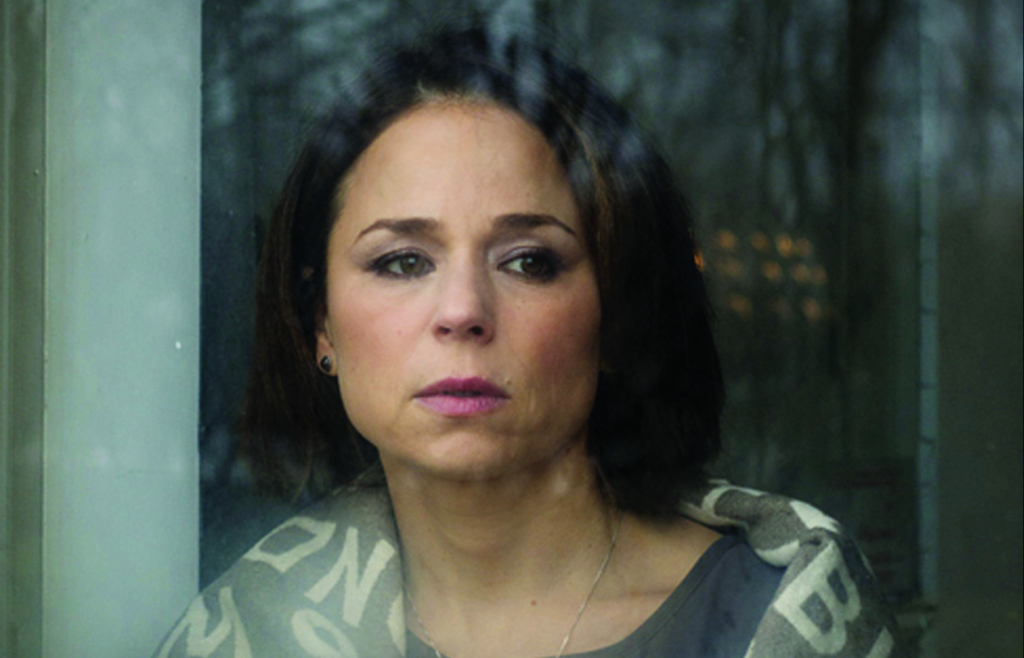
Maya’s presence creates a necessary counterpoint to such doom and gloom. While Early Winter is the polar opposite of a warm, welcoming experience, Clément’s performance gives it a vitality absent in both Doucet’s convincing sad-sack performance and Rowe’s lethargic rhythm. Indeed, Rowe praises Clément’s contributions as integral to the film, describing her as ‘a very intelligent actress’.
[S]he’s also very creative and, if she doesn’t have that creative space, it’s difficult. She contributed a lot to the film in terms of […] resist[ing Maya] being as horrible as she was originally written. She would improvise a lot. Some of those improvisations – which she did very intelligently, very intuitively – are in the film. They’re variations of the scenes, the way they were written, that soften Maya’s character and that make her own internal struggle more present.
Regardless of Clément’s contributions, it’s difficult to deny that Early Winter is an uninviting experience – a bleak foray into a marriage disintegrating before our eyes. This is by design; while Rowe might eschew many of the traditional filmmakers’ tools for provoking an emotional response, he nonetheless succeeds in drawing his audience into the defeatist, depressed headspace of a man without hope. The film’s final scene – wherein David returns home from the quarry – offers a modicum of optimism, but it’s a thin ray of light in a murky winter.
http://www.earlywinterfilm.com
Endnotes
| 1 | ‘Early Winter (2015)’, IMDb, <http://www.imdb.com/title/tt2625968/?ref_=ttfc_fc_tt>, accessed 18 May 2016. |
|---|
